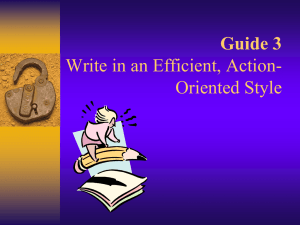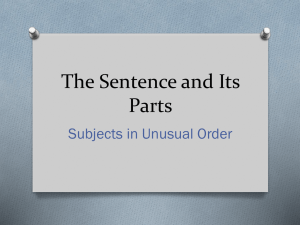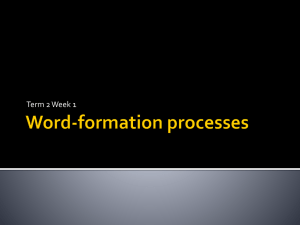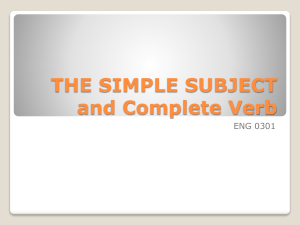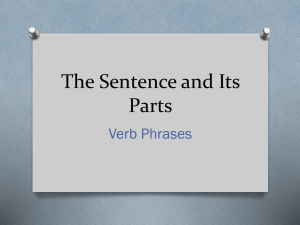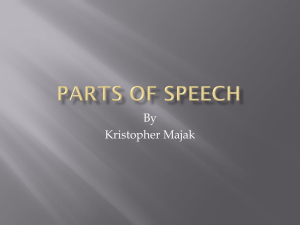你考得怎么样? - Kingswood Oxford School Chinese
advertisement
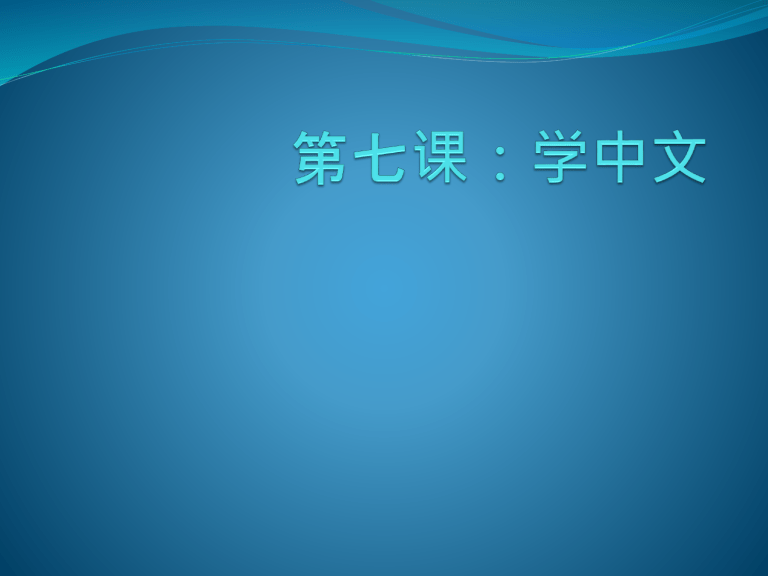
第一个谈话:你考试考得怎么样? 说话—shuōhuà 昨天晚上我跟我妈妈说话了。 复习—fùxí 我今天晚上要复习中文语法。 预习—yùxí 我昨天晚上预习了第七课。 教—jiào 我教汉语。 真—zhēn 她真漂亮! 语法—yǔfǎ 中文语法不难。 容易— róngyì 其实,中文语法很容易! 生词– shēngcí 我们昨天晚上学习了很多生词。 难– nán Verb-Object Verbs IE the combination of a verb and a noun 下雨xià yǔ 下雪 xià xuě 见面 jiànmiàn 点菜 diǎn cài 打球dǎqiú 唱歌 chànggē 跳舞 tiàowǔ 蓝色 = Verb 黑色 = Object 睡觉 shuìjiào 聊天 liáotiān 开会 kāihuì 打电话 dǎ diànhuà 回家 huí jiā 说话 shuōhuà 上网shàngwǎng Just Regular Verbs IE there is not a noun attached to the verb 听说 有 吃 忘 带 学习 喜欢 认识 放 要 形容词:Adjectives 多 容 好 晚 早 漂亮 丑 大 易小 方便 高兴 快 慢 有意思 Descriptive Complements Descriptive complement: describing how the verb is done. In this lesson, the words that function as the descriptive complement (the describing words) are all adjectives. If the complement is an adjective (which they all are in this lesson) then it is preceded by 很. FYI: Adverbs or entire verb phrases can also function as descriptive complements. Descriptive Complements with 得 There are two ways to use the particle 得 can be used: 1. When you want to describe how someone does something/how a verb is done. 2. To describe the result of a particular action. **Many verbs in Chinese (like the ones we just talked about) are composed of a verb and a noun put together. If the verb is followed by an object, you need to repeat the verb before you use the 得 + complement structure. 1. Describing How a Verb is Done If it is a VO verb, then you must repeat the verb: Verb-Object-Verb (again)-得-Complement 你打篮球打得很好。 她写字写得很好。 她昨天晚上睡觉睡得很晚。 爸爸开车开得很快! 你考试考得怎么样? 你平常起床起得很早。 妹妹歌唱唱得很好。 2. To Describe the Result of an Action Usually a time word is placed before or after the subject of the sentence to show that the action has already taken place. 昨天晚上我男朋友中国菜做得很好。 你说得很对。 你昨天晚上文章写得很好。 FYI: A verb can be modified by another verb. Q: 你看得懂吗? A: 我看得懂。 Q: 你听得懂吗? A: 我听得懂。 Negation with 得 • Use 不 not 没 • Will come before the adjective—never place before the 得 你说中文说得不好。 你起床起得不早。 你跑步跑得不快。 你考试考得不好。 第一个谈话:你考得怎么样? 上个星期的考试你考试考得怎么样? 我考试考得很好! 我考试考得不错。 我考试考得不好。 • 科目:数学/科学/历史/中文/法语/西班牙语 shuxue kexue lishi zhongwen fayu xibanyayu The adverbs 太 and 真 Intensifiers! Showing approval/disapproval of a statement 你说中文说得太好! 他说中文说得真好! 很他说中文说得很好。 非常 他说中文说得非常好! 特别 他说中文说得特别好! 请翻译一下。。。 这个电影太有意思了! 我的语法太不好了!我得多联系。 妹妹唱得非常好。 弟弟开车开得太快了! *When 太 is used in an exclamatory sentence, 了is often used at the end. The adverb 就 Used before a verb to suggest earliness/briefness/quickness of an action. IE using this word shows that you think the action was quick。 他明天七点就得上课。 我明天五点就得起床。 我们八点看电影,他七点半就来了。 The adverb 才 • Used before a verb to suggest lateness/tardiness of an action. •八点上课,小李八点半才来。 •我昨天晚上十二点半才回家。 •When commenting on a past action, 就 is always used with 了 to show promptness. 才 is never used with 了。 Ordinal Numbers Place 第 before cardinal numbers 第一 第二 第三 *Not used with months or order of siblings: 一月,二月 大哥,二哥,大妹,二妹 有一点儿: somewhat, rather, a little bit Comes before adjectives or verbs Often carries a negative tone 我觉得中文有一点儿难。 我觉得昨天晚上的功课有一点儿多。 妈妈今天有一点儿忙。 她有一点儿不高兴。 *Careful to not confuse 有一点儿 with 一点儿. 一点儿 modifies a noun and means “a little.” 照片:告诉我们一个故事! 第二个谈话:准备中文课 平常 这么 晚/早 功课 大家 上课 开始 课文 学习 怎么=how, how come? 请你教我怎么写“懂” 这个字。 你怎么没去看电影? 你的脸怎么这么红? 你今天起床怎么这么晚? Adjective + 的 = the one 我写了十个汉字:五个难的,五个容易的。 这件衬衫很漂亮!那件衬衫不漂亮; 我喜 欢蓝色的,不喜欢粉色的。 我今天有两个考试。中文的不太难,可是数 学的非常难,太长了! 小白很喜欢学中文。晚上预习课文,复习语法, 练习写汉字,常常很晚才睡觉。 Repeating 她 or 小白will be way too repetitive and makes the sentence seem really choppy. Unless the subject changes, do not use pronouns.


